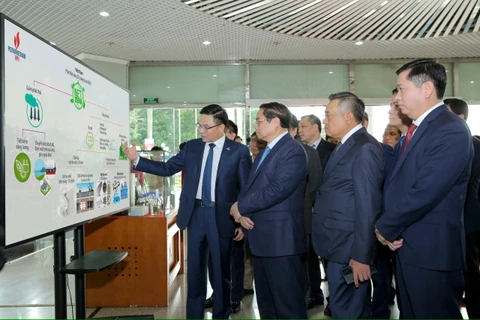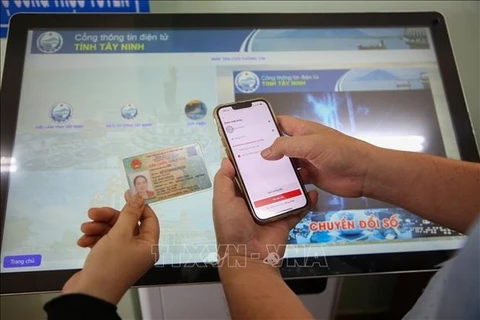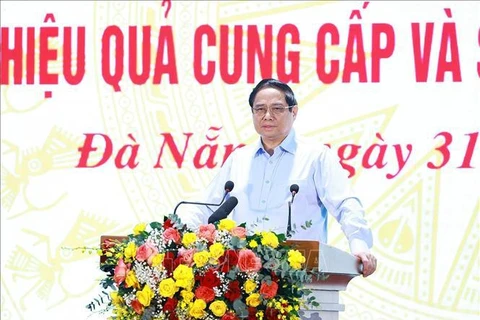Hanoi (VNA) – Prime Minister Pham Minh Chinh has ordered ministries, sectors, and localities to build their own digital transformation plans.
In Directive No. 34/CT-TTg dated September 16, 2024, the PM highlighted a number of positive outcomes in digital transformation, e-government building, digital economy and digital society development, and database building.
However, he pointed to challenges and shortcomings in the work, including slow completion of institution and administrative reform, difficulties in infrastructure building in some areas that have yet to access the national power grid, and the modest database sharing among State agencies.
The Government leader emphasised that digital transformation is a tough task requiring high determination, drastic actions, and clear definition of major mission, solutions, and breakthroughs, underlining that the project to develop the resident database, electronic identification and authentication to serve the national digital transformation in the 2022-2025 period, with a vision to 2030 (Project 06) chaired by the Ministry of Public Security is an important and breakthrough project in promoting national digital transformation, creating many utilities and services, bringing practical benefits, ensuring better services for the people and businesses.
The PM asked ministers, heads of ministry-level agencies and Government agencies as well as chairpersons of centrally-run cities and provinces to continue identifying breakthroughs, ensuring that they have their own breakthrough projects to implement digital transformation in their field and management scope.
During this process, ministries, sectors, and localities must stick to the reality in digital transformation, ensuring harmonisation and linkage with the implementation of Project 06, he asked.
Ministries, sectors, and localities with breakthrough projects must complete their projects by October 10, and define breakthrough areas and feasibility of the projects for implementation until 2025.
Ministers, heads of ministerial-level agencies and Government agencies, as well as chairpersons People's Committees of centrally-run provinces and cities are responsible to the PM for implementing the project in their sectors, fields, and localities. Monthly meetings will be held to review and resolve difficulties and problems in the implementation of the projects.
The PM tasked the Ministry of Information and Communications (MIC) – the standing agency of the National Committee for Digital Transformation – to announce the digital transformation infrastructure component model, clearly defining responsibilities and presiding agencies, which must be completed before September 30, 2024.
The MIC was requested to summarise the performance of ministries, sectors, and localities and report to the PM regularly.
The Ministry of Public Security was ordered to develop and complete a document summarising lessons learned from the implementation of Project 06 and disseminate it to ministries, sectors, and localities for reference. This task must be completed before September 20, 2024.
The Ministry of Finance was asked to allocate annual State budget funds to implement programmes, tasks, and projects under Project 06 based on proposals from ministries, sectors, and localities following the State Budget Law and related guiding documents.
Meanwhile, the Ministry of Planning and Investment was assigned to preside over the summary of annual public investment plans based on proposals from ministries, sectors, and localities during the implementation of programmes and projects according to the law on public investment./.
PM asks for development of digital transformation plans in ministries, sectors, localities
Prime Minister Pham Minh Chinh has ordered ministries, sectors, and localities to build their own digital transformation plans.
VNA
See more

Russia’s autonomous area wants to boost IT cooperation with Vietnam

Vietnam among pioneers in responsible technology development: Singaporean site

Deal with Nvidia helps realise Vietnam's plan to become regional tech hub: Journal

Vietnam expected to create hi-tech breakthroughs following partnership with NVIDIA

Vietnam invests in infrastructure for stable Internet development

Sci-tech, innovation – top priority in era of Vietnam’s rise: PM

NVIDIA to build AI research and data centres in Vietnam

Vietnam acts to train workforce for future of technology

Nineteen initiatives receive Vietnam Smart City Awards 2024

Techfest Vietnam 2024: Springboard for global startup success

Digital infrastructure development paves the way for national digital transformation breakthroughs

Techfest 2024 connects venture capital funds, local start-ups

Vietnam, Finland strengthen cooperation in green transition

Vietnam to have 100 million Internet subscribers by 2029

PM asks for greater efforts to develop innovative startup ecosystems

Techfest 2024 highlights local strengths in developing creative startup ecosystems

Global experts delve into earth, environmental sciences at int’l Vietnam confab

TECHFEST Vietnam 2024 crowns winners for innovation in healthcare, sustainability

Empowering communities through micro-credentials



